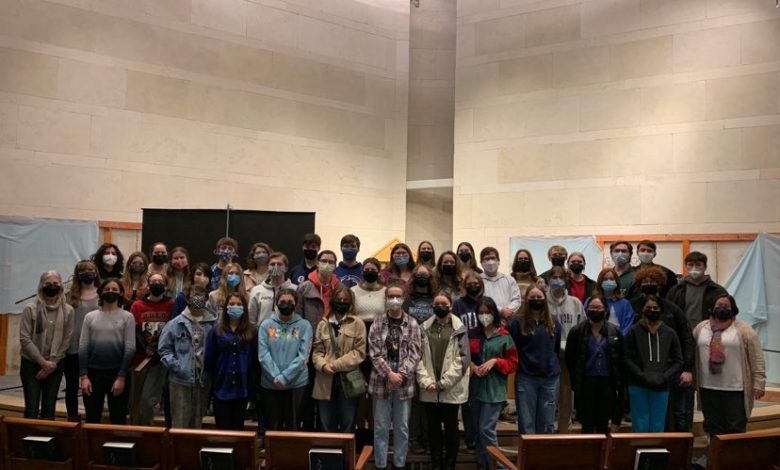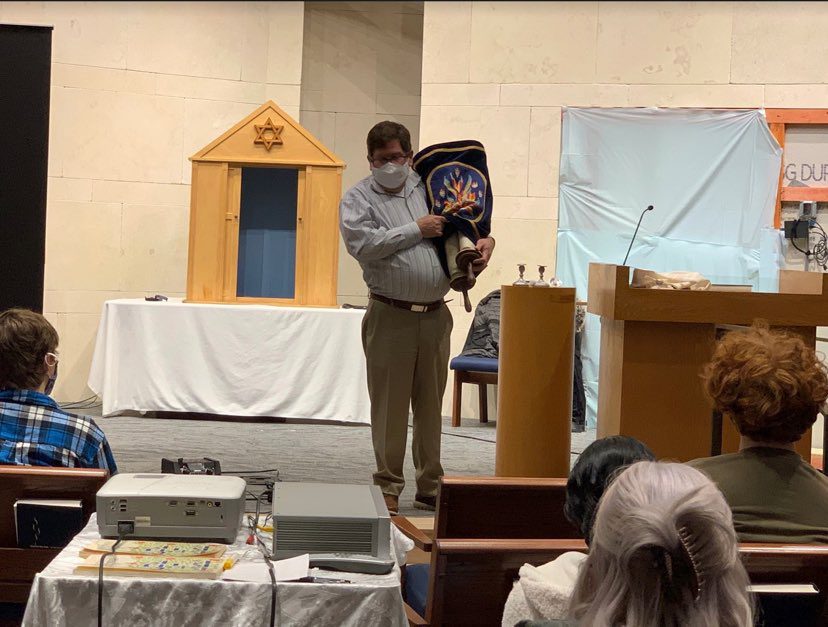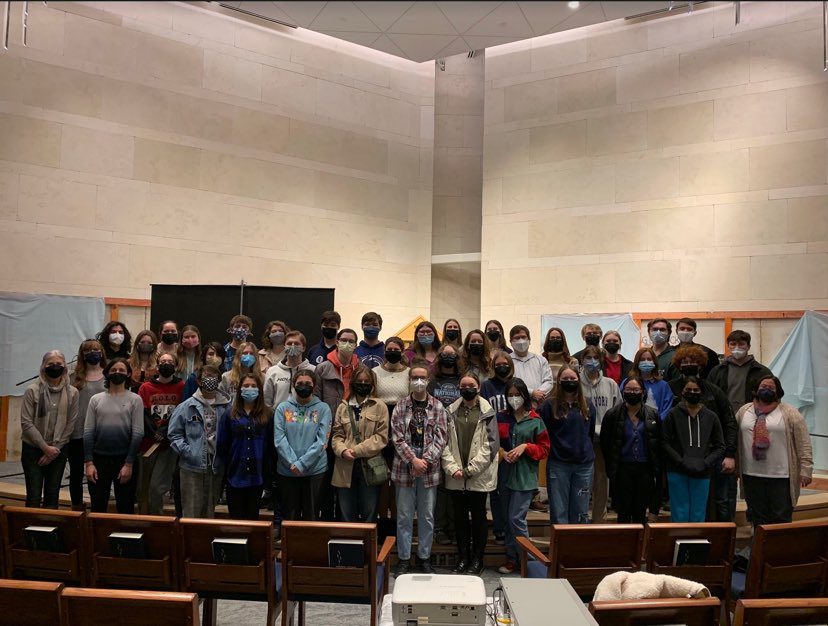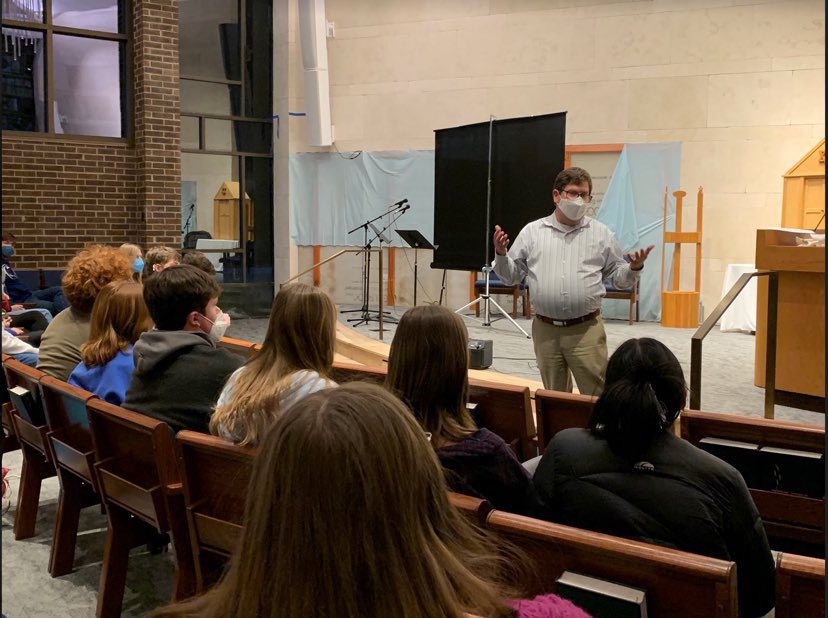Cast of Fiddler on the Roof visits synagogue to learn more about musical Jewish culture and traditions

Cast members of the upcoming Mahomet-Seymour High School production of Fiddler on the Roof will be among the first to tell you that they don’t know much about the Jewish people who lived in the town of Anatevka in czarist Russia in 1905.
Director Chris Taber knew this would most likely be the case, especially since she also knew the students would, most likely, not be familiar with the musical, either. And so, the directing team, including Music Director Liz Martin and choreographer Maggie Kinnamon, sought ways to build a bridge between each student’s acting and musical talent and historical background that would inform each performance.
“Each time there is a reference in the script to a historical occurrence, a name or a place they don’t know, or a Jewish ritual that they’re not familiar with, we address it,” Taber said.
Bringing a lot of experience with Fiddler on the Roof, Martin has been able to provide background to the story of Tevye, a poor Jewish milkman looking to arrange marriages for his daughters amidst the growing tension in his village, while Kinnamon has focused on teaching characters the types of moves and dances that might have been done in Russia during that time period.
“Within the lyrics of many of the songs are a lot of words and expressions with which many were unfamiliar, so Liz was able to shed some light on Jewish traditions and phrases,” Taber said. “For example, there is a song with the phrase “L’Chaim.” We talked about how that means “to life” (which is the name of the song in which the phrase is sung) or a general bestowal of blessings upon one’s friends.”
It’s one thing to learn something in an auditorium and another to learn from someone who embodies the present and history of a people, though.
Taber knows this. So, she reached out to Rabbi Alan Cook of the Sinai Temple in Champaign-Urbana. Cook was scheduled to come to Mahomet-Seymour High School on Feb. 5, but when that event was canceled because of snow, the students were invited to the Temple on Feb. 11 to talk to the Rabbi.
“I was glad that Ms. Taber had the sensitivity to connect with me to try to understand the Jewish experiences, themes, and perspectives that are key parts of this show,” Cook said.
As the Mahomet-Seymour team prepared for their visit with Rabbi Cook, students were given the opportunity to submit questions and interests in preparation for the conversation.



Sam Garber, who plays Fyedka, a Russian Orthodox man who marries Teyve’s daughter Chava, wanted to know more about how Judaism was practiced in different parts of Europe during the time of the play.
“I learned from the Rabbi that throughout most of Europe, Judaism was practiced relatively the same,” Garber said. “It was just practiced quietly so as to not upset the people around them.
“Some traditions and culture that I learned was that the Sabbath is the most important time for Jewish people. It happens every week and there are many duties related to it. Women light the candles, wash up before the sabbath, wine on the table, white robes, and many other things.
“For me, I think that meeting with the Rabbi really let us learn about the Jewish culture in a realistic sort of way. It will allow us to be culturally right in our acting, props, costumes, etc. I really think meeting with the Rabbi will wholeheartedly help this play be as authentic as possible.”
Kara Kinnamon, who plays Tzeitel who wants to marry her childhood friend, Motel the tailor, enjoyed learning about the traditional garments.
“I thought it was cool that they apply their teachings to what they wear, as well as their everyday life,” she said.
“Going to the synagogue helped me a lot with my knowledge on vocabulary and pronunciation for my lines. Another key factor was learning about gender roles at the time, which helps me connect to Tzeitel on a much deeper level.
“Meeting with Rabbi Cook was so incredibly valuable and important to our cast. I don’t think I would be nearly as comfortable doing a show like Fiddler, had we not gotten the opportunity to learn how to properly respect Judaism.”
For some members of the cast, visiting the Rabbi was their first time in a synagogue.
“It meant a lot to me to really learn about Jewish culture. It was a great experience to learn first hand from Rabbi Cook,” Nicholas Gilbert said.
Cook knew that for many this may have been the first time students participated in a deliberate conversation with a Jew.
“I hope that I helped to open some eyes and some minds to the possibilities that can arise out of building bridges with those who may be different from you,” Cook said.
Although some parts of the Jewish culture differ from that of the cast, Taber and Cook believe that performing stories like Fiddler on the Roof highlight the humanity that each culture shares.
“While “Fiddler” is a Jewish story at its heart, it also emphasizes important universal themes such as an embrace of diversity and cross-cultural understanding,” Cook said. “Though our instinct may be to gravitate toward those who think and behave the same way we do, there is much to be gained by hearing others’ stories and appreciating others’ traditions.”
Cook touched on the pronunciation of Hebrew and Yiddish words used throughout the script, talked about what it may have been like for Jews in the small Russian village at the turn of the century, and made a point to help students understand how traditions and rituals can stand the test of time.
“I hope that the students better understand what is driving the characters whom they will be portraying,” Cook added. “But more than that, I hope that they appreciate that Fiddler on the Roof is not just a work of fiction but builds on real experiences and concerns and joys and disappointments.”
Taber’s work now is to help bring the themes of Fiddler on the Roof to the Mahomet community in April (21-23).
“As storytellers, we have the opportunity to inform, challenge, open hearts and minds,” Taber said. “Theatre, which is storytelling, can show what others have endured that we haven’t, but also can remind us that the human experience is universal. We all experience love, regret, family connections and conflict, honor, and more. This shared experience binds us together.
“I’m hoping the fact that Fiddler on the Roof is a well-known title (at least to us who are “older”) will bring audiences to our theatre, and while in our special little theatre space experiencing this story with us, they may feel a bit more connected to the world at large. I feel that this is an excellent moment for us all to learn as much as we can about people who seem different from us. To try to walk in their shoes. Theatre is an excellent way to do that.”
As a theatre “buff,” Cook agrees.
“I hope that they enjoy an entertaining show featuring a fabulous and hard-working cast and crew,” he said. “But I also hope that audiences see the humanity of Tevye and his family and friends just trying to live a good life and make sense of their world. Each of us, regardless of our belief system or our background, deserves to be treated with dignity and respect.”





Thanks for the article! The cast, crew, and production team are working hard on this show and we can’t wait to share it with audiences!
April 22, 23, 29, 30, and May 1 are the show dates.
Come on out and support live theatre and these students!
I am so impressed with what was done to help the students connect correctly with history. Keep up the great work. This is one of my favorite plays.